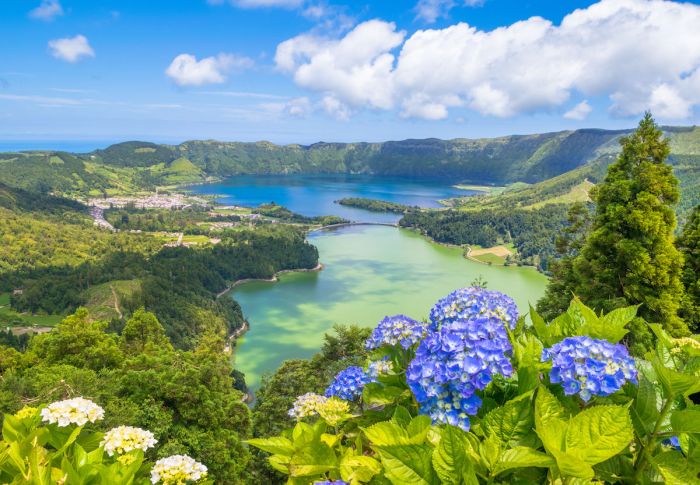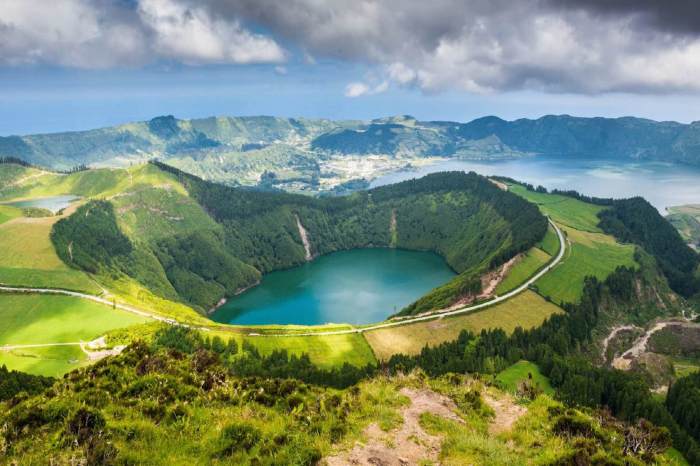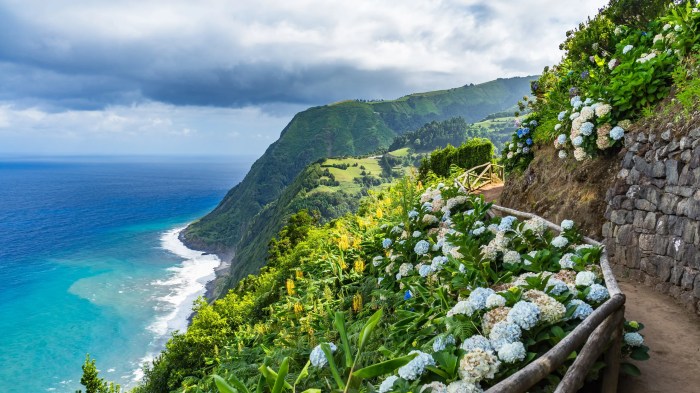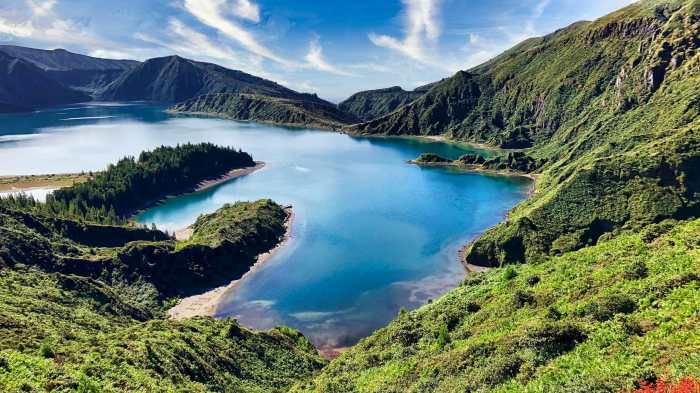The Azores, an archipelago nestled amidst the vast expanse of the Atlantic Ocean, captivates with its stunning landscapes, rich cultural tapestry, and strategic location as a crossroads between continents.
From its volcanic origins to its diverse flora and fauna, the Azores showcases the extraordinary power of nature. UNESCO-listed protected areas safeguard these natural treasures, underscoring the vital importance of conservation efforts.
Geographical Context

Nestled in the vast expanse of the Atlantic Ocean, the Azores archipelago forms a mesmerizing chain of islands approximately 1,360 kilometers west of mainland Portugal. These nine enchanting islands, namely São Miguel, Santa Maria, Terceira, Graciosa, São Jorge, Pico, Faial, Flores, and Corvo, are remnants of ancient volcanic eruptions that have shaped their unique geological landscapes.
Volcanic Origins and Geological Features
The Azores owe their existence to the tectonic activity of the Mid-Atlantic Ridge, where the North American and Eurasian plates diverge. Over millions of years, volcanic eruptions have spewed forth lava and ash, forming the islands’ diverse geological features. From towering peaks to bubbling fumaroles and geothermal springs, the Azores showcase a captivating tapestry of volcanic wonders.
Geographic Significance
Strategically positioned at the crossroads of Europe, North America, and Africa, the Azores have played a pivotal role in maritime exploration and trade throughout history. Their location has served as a vital waypoint for ships traversing the Atlantic, providing shelter, replenishment, and a strategic vantage point for centuries.
Natural Wonders: Azores
The Azores archipelago is a true natural paradise, boasting a breathtaking array of landscapes that will captivate and inspire. From volcanic craters to lush greenery and dramatic coastlines, the Azores offers a feast for the senses.
The islands are home to a diverse flora and fauna, including endemic plants and marine life found nowhere else on Earth. The archipelago’s unique biodiversity has earned it recognition as a UNESCO World Heritage Site, highlighting the importance of conservation efforts to preserve this precious natural treasure.
Volcanic Landscapes
- The Azores is a volcanic archipelago, and its landscapes bear witness to its fiery origins. Volcanic craters, such as the iconic Caldeira das Sete Cidades on São Miguel Island, offer stunning views and a glimpse into the islands’ geological history.
- The islands’ volcanic activity has also created unique geothermal features, including hot springs, fumaroles, and geysers, adding to the Azores’ otherworldly charm.
Lush Greenery
Despite its volcanic origins, the Azores is also known for its lush greenery. The islands are covered in dense forests, vibrant meadows, and rolling hills, creating a tapestry of colors and textures.
Dramatic Coastlines
- The Azores’ coastlines are as diverse as its landscapes, featuring towering cliffs, secluded coves, and pristine beaches.
- The islands’ rugged coastline is a haven for surfers, sailors, and nature enthusiasts alike.
Diverse Flora and Fauna
The Azores is home to a remarkable variety of plant and animal life, including many endemic species found nowhere else in the world. The islands’ unique ecosystem supports a wide range of habitats, from coastal wetlands to mountain forests.
- The Azores’ flora includes over 500 species of vascular plants, including many endemic species such as the Azorean heather and the Azorean laurel.
- The islands’ marine life is equally diverse, with over 1,000 species of fish, mollusks, and crustaceans, including the endangered sperm whale and the common dolphin.
UNESCO-Listed Protected Areas
Recognizing the importance of the Azores’ natural heritage, UNESCO has designated several protected areas within the archipelago. These areas include:
- The Azores Natural Park, which covers over 10% of the archipelago’s land area and protects a wide range of habitats and species.
- The Faial Caldera, a UNESCO Global Geopark that showcases the islands’ unique geological formations.
- The Corvo Island Nature Reserve, which is home to a diverse array of seabirds and other marine life.
These protected areas play a vital role in preserving the Azores’ natural wonders for generations to come.
Cultural Heritage

The Azores, an archipelago in the mid-Atlantic Ocean, has a rich and diverse cultural heritage shaped by centuries of Portuguese influence and isolation. The islands’ unique traditions, festivals, and architectural landmarks reflect the archipelago’s fascinating history and cultural tapestry.
Early Settlement and Portuguese Influence
The Azores were first discovered by Portuguese explorers in the 15th century. The islands were uninhabited at the time, and the Portuguese began settling them shortly after their discovery. The early settlers brought with them their language, customs, and traditions, which formed the foundation of Azorean culture.
The Azores, a breathtaking archipelago in the Atlantic, offers a tranquil escape from the hustle and bustle. If you’re an Amex Platinum cardholder, take advantage of exclusive benefits to elevate your Azores experience. From complimentary airport lounge access to priority boarding, enjoy seamless travel and immerse yourself in the natural wonders of this captivating destination.
Unique Cultural Traditions
Over the centuries, the Azores have developed their own unique cultural traditions and festivals. One of the most famous is the Festa do Senhor Santo Cristo dos Milagres (Feast of the Lord Holy Christ of Miracles), which is held annually in Ponta Delgada on the island of São Miguel. The festival features a procession of elaborate floats and religious ceremonies.
Architectural Landmarks and Historical Sites, Azores
The Azores are home to a number of architectural landmarks and historical sites that tell the story of the islands’ past. The Convento de São Francisco (Convent of Saint Francis) in Angra do Heroísmo on the island of Terceira is a UNESCO World Heritage Site and one of the finest examples of Portuguese Gothic architecture in the Azores.
Economic Activities
The Azores economy primarily relies on agriculture, fishing, and tourism. Agriculture focuses on dairy farming and producing pineapples, tea, and tobacco. Fishing is vital, with tuna, swordfish, and lobster being the main catches. Tourism has boomed in recent years, driven by the islands’ stunning natural beauty and outdoor activities.
Challenges and Opportunities
The local economy faces challenges such as remoteness, limited infrastructure, and a small population. However, opportunities exist in developing sustainable tourism, promoting local products, and attracting investment in renewable energy and technology.
Sustainable Development
The Azores are committed to sustainable development. Initiatives include preserving natural habitats, promoting responsible tourism, and supporting local communities. These efforts aim to balance economic growth with the protection of the islands’ unique environment and cultural heritage.
Tourism and Recreation

The Azores archipelago offers a plethora of captivating experiences for tourists and recreation enthusiasts alike. From breathtaking hiking trails to exhilarating whale-watching tours, the islands provide an unforgettable escape into nature’s embrace. This guide will unveil the top tourist destinations and activities, ensuring an enriching and memorable journey.
The Azores, a breathtaking archipelago in the Atlantic, offers an idyllic escape for beach enthusiasts. While packing for your adventure, don’t forget to consult our comprehensive beach holiday packing list. It will guide you through essentials like swimwear, sunscreen, and beach towels, ensuring you’re well-prepared to soak up the sun and embrace the pristine shores of the Azores.
Outdoor adventures abound in the Azores, with an array of hiking trails that traverse diverse landscapes, from lush forests to volcanic peaks. Whether seeking a leisurely stroll or a challenging trek, there’s a trail tailored to every preference. The islands’ unique geological formations create stunning backdrops for these hikes, offering panoramic views and unforgettable encounters with nature.
Whale Watching
Whale watching is a quintessential experience in the Azores, renowned for its abundance of marine life. Embark on a guided tour and witness these majestic creatures in their natural habitat. From playful dolphins to awe-inspiring whales, the archipelago provides an unparalleled opportunity to observe these magnificent animals up close.
The Azores, a picturesque archipelago in the Atlantic Ocean, is a haven for nature enthusiasts. Its stunning landscapes and rich biodiversity make it a paradise for hikers and bikers. While the Azores may not have an extensive network of dedicated bike trails like the Atlanta BeltLine , it offers plenty of off-road adventures and scenic routes that will challenge and captivate even the most seasoned cyclists.
The rugged terrain and breathtaking coastal views will create an unforgettable cycling experience in the heart of the Atlantic.
Local Cuisine
The Azores’ culinary scene is a testament to the islands’ rich cultural heritage. Savor the flavors of traditional dishes, such as cozido, a hearty stew made with meat, vegetables, and bread, or indulge in the freshest seafood, caught daily from the surrounding Atlantic waters. Local cheeses, such as São Jorge and Pico, are also a must-try, offering a taste of the islands’ unique terroir.
Accommodations
The Azores offers a range of accommodations to suit every traveler’s needs. From charming guesthouses to luxurious resorts, there are options for every budget and preference. Many accommodations embrace the islands’ natural beauty, offering stunning views and tranquil surroundings that enhance the overall experience.
Transportation
Getting around the Azores is convenient and efficient. Inter-island flights connect the main islands, while ferries provide access to smaller islands and coastal areas. Within each island, rental cars offer the flexibility to explore at one’s own pace, while public transportation provides a cost-effective alternative.
Final Conclusion

The Azores stands as a testament to the harmonious coexistence of nature and culture. Its vibrant history, unique traditions, and architectural landmarks paint a vivid portrait of the islands’ past and present. As a destination for adventure, relaxation, and cultural immersion, the Azores beckons travelers to explore its enchanting shores.
Quick FAQs
What is the best time to visit the Azores?
The Azores enjoys a temperate climate year-round, making it an ideal destination anytime. However, spring and fall offer the most favorable conditions for outdoor activities.
How do I get to the Azores?
The Azores is accessible by air through its main airport, Ponta Delgada Airport (PDL), with connections to major cities in Europe and North America.
What are the must-see attractions in the Azores?
The Azores offers a wealth of natural and cultural attractions, including volcanic craters, lush forests, whale watching, historical sites, and traditional festivals.